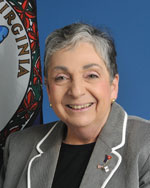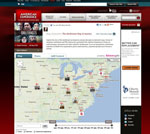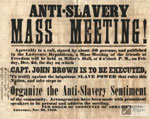
 |
The Library of Virginia has joined forces with Dominion Virginia Power to form a new program. The Library of Virginia’s African American Trailblazers in Virginia History and Dominion’s Strong Men & Women: Excellence in Leadership series are now one program—Strong Men & Women in Virginia History. In observance of Black History Month, the Library of Virginia and Dominion are honoring eight distinguished Virginians as the 2013 Strong Men & Women in Virginia History for their contributions to Virginia and the nation. Those being honored this year include men and women who were born into slavery but rose to become legislators and educators, as well as those who continue to push back frontiers in their communities, the military, and even space. This year’s honorees are: Nannie Berger Hairston (1921– ), Christiansburg Gwen Bingham (1959– ), Prince George County Biographies of the honorees will be displayed in an exhibition at the Library in February; featured on materials that have been sent to schools, libraries, and museums across Virginia; and included on an educational website for teachers and students. To learn more about these extraordinary men and women, all of whom have used their talents and creativity to push for equality and inclusion in American society, visit our website at: www.lva.virginia.gov/public/smw. |
| << back to e-newsletter |

Meyera Oberndorf, chair of the State Library Board, has resigned from the position effective December 10, 2012. Oberndorf, who recently lost her husband of 51 years, cited his death and recent health issues as the reason for her resignation. Oberndorf was appointed to the board in 2009 by Governor Timothy Kaine and served as vice chair from 2011 until assuming the chairmanship on July 1, 2012. She rose from service as a member of the Virginia Beach Public Library Board to become the Virginia Beach's first elected mayor and held the seat for 20 years, until 2008. “Meyera is passionate about the value of public libraries and was an effective advocate for the Library of Virginia,” said Librarian of Virginia Sandra G. Treadway. “When the Library of Virginia held a symposium in 2005 for its exhibition Working Out Her Destiny: Women’s History in Virginia, Meyera Oberndorf was one of the first women we contacted to participate in the History Makers’ panel featuring path-breaking Virginia women. She was a force in local government, guiding Virginia Beach through a period of tremendous growth and change.” |
| << back to e-newsletter |

How did views on slavery evolve in the decades leading up to the Civil War? What different concerns did Quakers, soldiers, and revolutionaries express about the freedom of enslaved people? What evidence can we find in the Library of Virginia’s collections about the anti-slavery movement in the early and mid-1800s? This unique challenge arose through the Library’s early involvement in HistoryPin, an interactive website to which we upload geotagged photographs and other archival material to Google maps. Each image is accompanied by descriptive metadata, but users can also add their own “stories,” allowing for multiple and personal interpretations of history. Audio and video clips can also be pinned. See our HistoryPin collections at www.historypin.com/channels/view/id/28759/. 
PBS’s popular documentary series American Experience has partnered with HistoryPin to use this digital platform to tell the story of abolitionists. The Library of Virginia was selected to contribute to this exploration of the anti-slavery movement in America—the Abolitionist Map of America. Dozens of museums, libraries, and archives have helped populate the map. PBS will also upload several video clips from their upcoming documentary series The Abolitionists, which will air on Tuesdays, January 8–22, 2013. A mobile app and walking tours of Boston, Charleston, Cincinnati, and Philadelphia allow users to explore the Abolitionist Map in multiple ways. The abolitionist materials assembled by the Library include broadsides, personal letters, state correspondence, illustrations, book excerpts, legal documents, and more. Most have been pinned to the location of publication, the recipient’s address, or the library itself. The Library's pins range from those in Richmond, Virginia, to Harper’s Ferry, West Virginia, to Boston, Massachusetts. At last count, the Abolitionist Map of America offered approximately 600 pins—and is still growing. Explore the pinned content, add your comments, and do more at www.pbs.org/wgbh/americanexperience/features/interactive-map/abolitionists-map. –submitted by Sonya Coleman, Information Technology Services |
| << back to e-newsletter |
Earl Hamner Program Postponed Until April 2 The January 16 evening program featuring Earl Hamner, Jr. has been postponed due to the author’s illness. The program has tentatively been rescheduled for April 2. Please watch our website for additional details on this program. |
| << back to e-newsletter |
ProQuest’s Historic Map Works is an exciting new addition to the Library of Virginia’s online collections. The database provides access to more than 1.5 million U.S. cadastral (land ownership) maps with extensive coverage of cities and towns, as well as rural and suburban areas from the late 1700s to the present day. It also includes more than 100,000 antiquarian maps from the University of Southern Maine's Osher Map Library and dated from the 15th to the 19th centuries. A portion of the collection consists of geocoded maps, which can be searched by address or latitude and longitude coordinates, and overlaid with present-day Google map images, allowing users to see changes that have occurred in specific locations over decades or centuries. One can view a 1777 map of Philadelphia and then use an onscreen slider bar to partially or completely overlay a present-day map of the same location. The Points of Interest Map Finding Tool contains 3 million of the most popular places and geographical features found within the atlas collections. It can be particularly helpful when an exact place-name or county is unknown or a geographic area is unfamiliar to a researcher. To further assist users, access is provided to more than 1,000 U.S. city directories, as well as an assortment of other types of directories. The database also includes illustrations of residences, schools, churches, and other structures included in the atlases. For example, the 1885 Augusta County, Virginia, atlas includes illustrations of the Augusta Church, the Augusta Male Academy, the Augusta National Bank, and portions of the Augusta Female Seminary, in addition to illustrations of more than 40 individual residences. A Special Collection category provides a mix of maps (decorative plates, lithographs, and nautical and topographical maps), photographs of individuals and places, railroad timetables, postcards, advertisements, and other ephemera. High-resolution digital scanning clearly reproduces even the smallest features, including street and property names, plat dimensions, and structural details. Users can see image previews, zoom in and out, and crop and save images. The database is updated monthly with additional map images, directories, and illustrations. This database can be used to uncover clues about historical structures, property boundaries, landownership, and much more. Your Library of Virginia library card is your key to exploring this wonderful resource. Stop by the Library to get a card and visit the Library’s Using the Collections page to begin your research! –submitted by Lisa Wehrmann, Public Services and Outreach |
| << back to e-newsletter |
The deadline to nominate books for the Library of Virginia’s annual literary awards is February 15, 2013. Books eligible for the awards must have been written by a Virginia author or, for nonfiction books, have a Virginia-related theme. A Virginia author is defined as a writer meeting one or more of the following qualifications: a native-born Virginian, an author living in Virginia, or an author whose permanent home address is in Virginia. Entries can be submitted in the following categories: fiction, nonfiction, or poetry. Entries for the 2013 awards must have been published and distributed between January 1 and December 31, 2012. Submissions must include four copies of each book nominated. The following types of books are not eligible for the awards: reference works, anthologies, documentary editions, children’s and juvenile literature, photographic books, self-help books, and “how-to” books. Entry forms can be submitted online (www.lva.virginia.gov/public/litawards/nominate.asp) or completed as an interactive PDF and mailed to: The Library of Virginia Literary Awards, 800 East Broad St., Richmond, Virginia, 23219-8000. For more information, please call 804-692-3535. |
| << back to e-newsletter |
The Library of Virginia has a place in the United States Electoral College, the little-known and understood mechanism by which America elects its presidents. On December 17 Virginia’s 13 electors (equal to the number of representatives and senators in Virginia’s congressional delegation) met in the State Capitol and cast 13 votes for the re-election of President Barack Obama. Librarian of Virginia Sandra Treadway was on hand to show the electors Virginia's Electoral College return, as well as election certificates from the first presidential election and the Journal of the College of Electors, 1804–1856. The Library of Virginia is the commonwealth's keeper of a copy of the certification of votes and the certification of ascertainment for the 2012 presidential election. The Library has a variety of records in several collections (Secretary of the Commonwealth, Office of the Governor, Virginia General Assembly, etc.) related to Virginia's Electoral College from 1789 to 2008. Today, copies of the Certificate of Ascertainment and Certificate of Vote are transferred to the Library by the Virginia State Board of Elections. The Certificate of Ascertainment lists the names of the electors appointed and the number of votes cast for each person during the general election. |
| << back to e-newsletter |